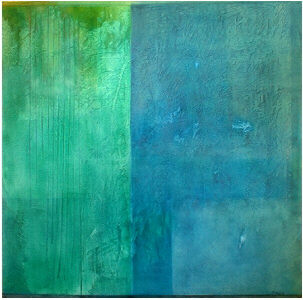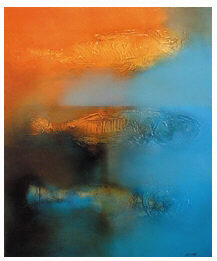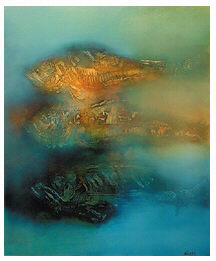 April 06
April 06
With A Strong Hand And An Outstretched Arm
by Jeremy Mullem
p. 3 of 3
On a snowy day in February, we buried him in the plot his parents had bought for my parents as a wedding present (another story I won't go into). The plot is in a cemetery in Valhalla, New York that is tucked into a nice little valley. On that day the hills were white and the trees were bare. Caps of snow had formed atop the stones mourners had left at the other graves. I remember the wind hurting my ears and the parked backhoe that the cemetery people had used to tear open the frozen ground. A cemetery rabbi performed the service. We told him that my father had liked  Michael Jordan and Joe Montana and that he had loved being a surgeon. The rabbi repeated these things in his eulogy. It was not a bad speech. I like the idea that my father is buried in a place called Valhalla. The name fits.
Michael Jordan and Joe Montana and that he had loved being a surgeon. The rabbi repeated these things in his eulogy. It was not a bad speech. I like the idea that my father is buried in a place called Valhalla. The name fits.
After the funeral, my mother, sister and I returned to California. People—colleagues, patients, friends—called on us in the days that followed. I went through my father's things. He had ordered a new handgun just before his death and the waiting period had expired. I told the shop to cancel the sale. In the leather briefcase my father took to his clinic every day, along with various papers and bills and the science fiction novel he had been reading, I found a thick pamphlet on colorectal cancer. There were no tabs or marks on the pamphlet, nothing besides its inclusion in the briefcase to indicate that it had been read.
*
I've taken you too far away from the story I promised to tell. Worse, I've put a "true" story beside it and it seems these days that fiction cannot compete with non-fiction. That, I think, is a shame. I need you, for now, to hold onto both of these stories, to refrain for a moment from trying to sift what is literally true from what I have borrowed or abridged or invented. So, one final digression, then I will give you the end of this story I have been struggling with. In the end, it is only the end that matters.
*
A few months ago, after I had asked the woman who is now my fiancé to marry me and she and I had moved in together, a friend of mine who happens to be the literary editor of the magazine you are reading now and who has read sections of the novel that I am still working on, asked if some of it might be excerpted and made into a story. He was trying to help me out, give me an easy publication at a time when I was struggling to find time to write. Some of the characters in that novel are what I would call incidentally Jewish. Their religion is both as essential and as irrelevant to the novel as their hair color. My friend thought that was provocative in a limited way. He wondered what a short-story with characters identified as Jews but whose religion has nothing to do with the plot might say about being Jewish in contemporary America. I told him that nothing from the novel really stood on its own. Then I mentioned that I had a Passover story he might like. It needed, I told him, just a little work.
About a week later, as I was standing in the shower in the row house on Capitol Hill that my fiancé and I had rented, the end of Solomon's story came to me. It is a stretch to ascribe to a moment of creative insight the clarity that is supposed to mark a garden-variety literary epiphany. But let me tell you, when I turned off that shower and dressed and came downstairs to write what you are reading now, what I felt was remarkable.
And so, after all this build up, here is the ending I imagine:
I'm still a character in Solomon's story.
In the apartment, they still look at me when I walk into the dining room. Again, no one laughs at my Elijah joke.
"Ruth," I say, "you are not my grandmother. Solomon, you are not my grandfather. Gloria, you are not my mother. David, you are not me. I have led you into a Sinai of my own making. I have no path to offer."
"There won't be a Jerusalem either. Not for any of us," David says. "Big deal." He waves a hand before his
face. "Also," he adds, "metafiction is cheap. You basically said so yourself."
"Yes, but this story is important to me."
"Which," David says, "yours or ours?"
"They are the same story. That is what I have been getting at. It's what I realized a few minutes ago in the shower. You all are helping me tell my story."
"That," he says, "is what makes this utterly solipsistic."
"I hate it that you named me Gloria," Gloria says. "You named me that because of Sally Struthers from All in the Family. You think she was whiney."
"That's true," I say.
"You made me a bitch," she says. "At least Sally Struthers was nice."
"I'm sorry. But I have been carrying you around in my head for five years. I have some real emotion here. You are all important to me."
David crosses his arms. "If you say that you couldn't have written this without us, I'm going to punch you in the mouth."
Ruth gives me a look of consternation. "What I don't understand," she says, "is why your grandmother would be vain enough to be jealous because of your grandfather's puppy love but would allow herself to be seen in orthotic clogs and support hose."
"Arthritis is tough," I say. "It robs people of dignity."
"You're the thief," she says. "You stole that awful, painful moment of jealousy from your grandmother and you would share it with the world even though it doesn't even have anything to do with what you really wanted to write about. For that theft, you killed your grandmother."
Solomon clears his throat. "A Sinai of your own making," he scoffs.
"There's some poetry there," I tell him. "I've been repeating those words to myself for years. I can't stop."
"For five years you've thought about us from time to time. What is that compared with forty years in the desert?"
"Not much," I say. "I admit that."
"You are not God," Solomon says. "A writer isn't God. You made nothing. You haven't created a world. You haven't even created this apartment and this dining room. You stole them from your memory. And your memory was wrong. There was, for example, no piano."

"There was," I say. "My uncle played it. My mother's brother."
"Ha!" Ruth says. "Did you kill this uncle too?"
"I had to cut him out. There were too many characters. I've said that."
"Do I not get to speak?" Josephine asks. "Or am I just a black prop here?"
"No," I say. "My grandfather was smitten."
"Not with me he wasn't. You remember the look on your grandfather's face. You don't remember the face of the woman he was looking at. You know that she was black and an immigrant. You know that when your grandmother was declining, your mother hired a woman from Ghana to help her. You're pretty sure your grandfather's helper was from the Caribbean. Haiti was a guess."
"This is not a workshop," I say. "I don't have to take this."

"Yes," David says, "but all this present tense writing makes it sound like you think this is a movie. And it doesn't make sense to use the present tense to describe past events. You're a writing teacher. That's basic."
"The experience of reading is a present tense act," I say to him. "So is creation."
"You're spouting on about creation again," Solomon says. "A writer is not God. He should not make himself superior to his characters. Look what you did to David. You had him slobbering over Josephine. You had him reading in poor Hebrew from a children's book. But will you admit to your readers that you had to confirm much of the Judaica that appears here using Google? Doesn't that say more about a certain kind of Jew in contemporary America than anything you've created?"
"The things I checked were spellings mostly."
"Will you admit that at your grandmother's funeral, when the rabbi, who was himself sick and old, asked you to bend to read the Hebrew name on your great-grandfather's gravestone, you guessed?"
"There were no vowels and I'm pretty sure I got it right. And none of that has to do with this story."
"Don't sit with us," Solomon says. "We are not waiting for anything. You," he says, "you are the one who is waiting. You will wait for the rest of your life, forty years if you are lucky and you don't die young as your father did."
"I don't know about that," I say.
"Yes you do," Solomon says. "Tell me," he demands, "why did you change the name of this 'story,' as you keep calling it? Why not Next Year in Jerusalem? You changed the title because you realized it wasn't going to be just a clever way of alluding to how you had abandoned us. You changed it when you shifted your focus away from me, because the old title would have made you uncomfortable. You changed it because it's for you that there will be no figurative Jerusalem."
With this, I banish my characters. I will not think of them again or, at least, I do not believe I will want to. Solomon, as befits a man of his name, has my number cold. I will be waiting for the rest of my life to know if my father knew that he was going to die. I will live the rest of my life wondering why, if he did know, he told no one. I will never have my answers.
All the other untold and unknown stories, the ones about the escape from Austria that my grandfather and great-uncle never shared, the precise reasons for my grandmother's early contempt for my father, his own story of abuse and early unhappiness, the stories of the Austrian guard who turned his back at that station, of the women who cared for my grandparents before they died, of the woman my grandfather helped, of the old rabbi, of my mother's brother, of the friends of mine my father saved, of my high school and Iowa girlfriends, of my teachers and the children and grandchildren my father brought into the world: I don't and won't dwell on any of these. I have no mind for the future. I needed to create Solomon to admit my Sinai. And now, having admitted it, you will understand why I cannot disguise my father as one of my characters. Think what that would have done to the story. I would not have waited for the second Seder. I would not have waited for David to open the door for me. I would have appeared in the dining room on the first night, asking, begging him to tell me what I want to know. There wouldn't be much drama in that. No arc. No development. You would be entirely within your rights not to care about any of it.
As for the new title, which has come to me as I have been sitting here writing, it is, I think, a less commanding, less arresting phrase than "Next year in Jerusalem" or "This is on account of what the Lord did for me when he took me out of Egypt." It is also, I think, a little nonsensical, perhaps the product of some careless English translator working just a few centuries ago. But the line has a bit of magic to it for me. My father always said it with flair. As he spoke, he would outstretch his own arm and open his own strong, surgeon's right hand. He had small hands for a man of such a large personality, but they were hands that could reach into the most delicate places. When he pronounced the old words, I could believe that I had been delivered out of bondage. Reading them now reminds me of him, and I miss him very much.
Bill Bragg, Life Cycle 1 & 3
Jeremy Mullem teaches writing at American University, Washington College of Law in Washington, DC.








